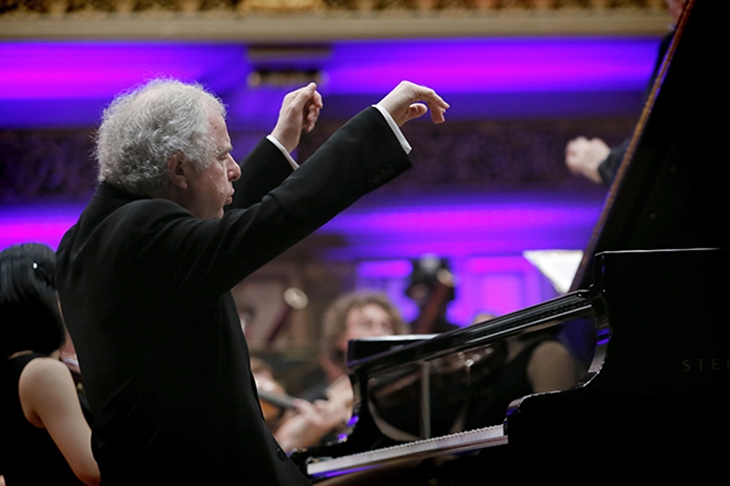Are Beethoven’s ‘Diabelli’ Variations really ‘the greatest of all piano works’, as Alfred Brendel claims? It’s hardly what you would call received wisdom. Even Stephen Kovacevich, who has given us two visionary recordings of the Diabellis, thinks some of the 33 variations are ‘boring’. I don’t agree, but I can understand why Brendel’s judgment seems odd.
When the minor composer-cum-publisher Anton Diabelli sent his jaunty ‘waltz’ — really more of a country dance — to dozens of composers, he was hoping they’d each write one variation. He probably wasn’t expecting to hear back from the most famous and cranky person on his list — so you can imagine his astonishment when, four years later, a fat parcel of prime Beethoven arrived in the post. Diabelli was as keen on making a quick buck as LvB, which is saying something, and rushed to publish them. He couldn’t have cared less that many, if not most, of the variations were poking fun at his little piece.
The ‘Diabelli’ Variations are perhaps the only work of art that could be described as sublimely quirky. Or quirkily sublime. Beethoven spends a whole hour playing tricks with every aspect of the waltz — which is incredible when you consider that it hardly has a tune. Instead, an opening twiddle is followed by chugging chords in the right hand, the skeleton of a melody in the left and stabbing bass octaves.
Beethoven is intrigued by those octaves. He uses them to build an exultant Handelian fugue that precedes the last variation, a minuet which turns into a spider’s web of exquisite modulations. And then he ends by dumping a loud C major chord into the middle of a bar, as if to say: ‘That’s all, folks!’
But back to those octaves. They’re everywhere in the score. Beethoven wants the pianist to make us jump. But there’s a difference between a well-aimed stab and going mad with a nail gun, which is pretty much what Piotr Anderszewski did when he played the ‘Diabelli’ Variations at the Peterhouse Theatre in Cambridge.
That’s painful to report, because in most of his repertoire Anderszewski displays a mixture of disciplined intensity and creative bravery. He has an exceptionally powerful left hand, which enables him to spotlight lower-register voices that other pianists relegate to an accompaniment. But in the Diabellis it’s his undoing. There are too many ear-splitting, bass-heavy moments in his 2001 recording of the work, and in the small Cambridge auditorium they were relentless.
When the CD came out, most critics gushed. That puzzled me, because, in addition to the unnecessary banging, Anderszewski made two horrible decisions. Variation 14, marked Grave e maestoso, is a sort of grief-stricken funeral march, double-dotted like a baroque overture. Some performers can stretch it to over four minutes and still maintain the tension. In the recording Anderszewski kept us hanging around for nearly six and a half minutes. In Cambridge I reckon it was longer. Time stood still, the way it does when your plane is cancelled.
He repeated his other misjudgment, too. That disconcerting final chord is a quaver marked forte. Beethoven, unlike other composers, took enormous care over his dynamic markings. This one in particular is loaded with retrospective significance. It’s an act of musical vandalism to play the chord quietly, as Anderszewski did in the studio — and even worse if you let it fade into a Debussian whisper, as he did here.
Two nights later Sir Andras Schiff played all six Bach keyboard Partitas at the Wigmore Hall. But first he gave us a little talk in which he described Bach as a great European, internationalist and humanist. If he wants to believe that, fine; some folk think the Egyptian pyramids were built by Martians. He also introduced us to his beloved Bösendorfer, hand-made from a wood he chose himself. Then he launched into performances of the Partitas in which you could just about distinguish between the dances above the purr of his mahogany limo.
I’m sorry to sound churlish. Anderszewski and Schiff are both venerated pianists. But in my experience they’re the ones most likely to let you down if you encounter them in overfamiliar repertoire. After hearing Schiff, I cleansed my palate with Charles Owen’s sparking recording of the Partitas (but not all six at once, which is just ridiculous). For the Diabellis I roamed around Spotify for ages but ended up, as I knew I would, with Brendel. This is one work in which he never let an audience down. It’s hard to choose between a white-hot performance from 1976 or a more meditative concert from 2001 in which the final variation is sheer perfection. Either way, when Beethoven says ‘That’s all folks!’, it really does feel as if he’s called time on the greatest piano work ever written.







Comments